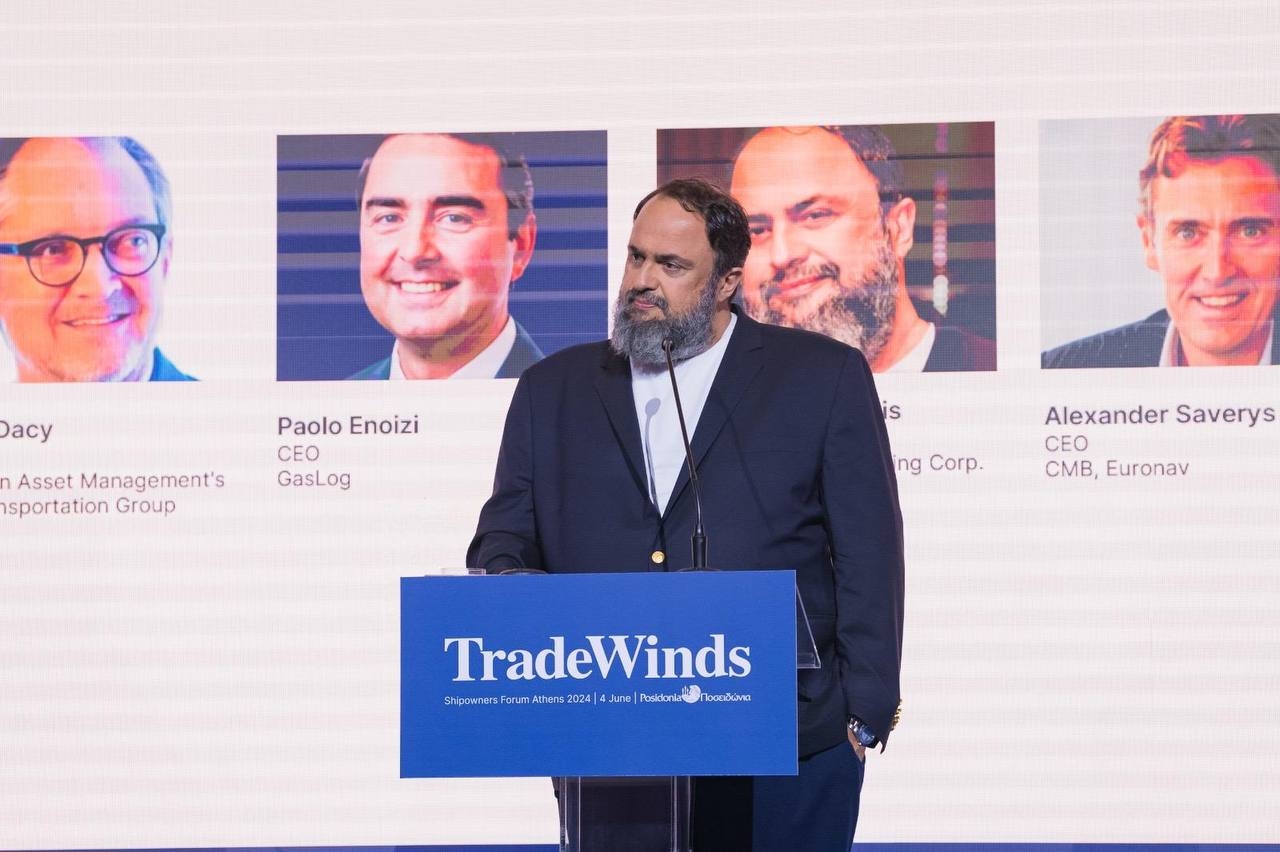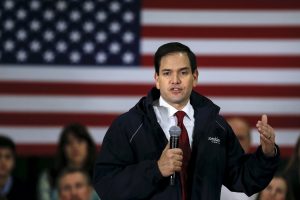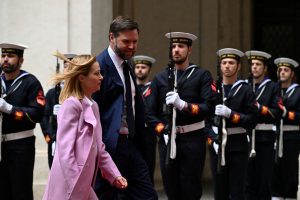The prospects and challenges faced by ocean-going shipping, especially energy transport, dominated a panel discussion on Tuesday at the TradeWinds Shipowners Forum, held on the sidelines of the world’s biggest shipping exhibition underway in Athens this week, Posidonia 2024.
The prestigious shipping event has attracted shipowners, executives, analysts and stakeholders’ representatives from every facet of the global industry, and will continue until Thursday at the Metropolitan Expo center adjacent to the Athens International Airport (AIA).
In his first statement, and in response to a question citing Capital Maritime & Trading Corp.’s major presence in energy transport and the prospect of changing markets, as well as how he’s taking his company forward to “extract opportunities from that challenge”, its founder and Chairman Evangelos Marinakis underlined that forecasts in shipping are never easy, and, in fact, are often akin to betting.
“We bet for what happened yesterday, for what is happening today and for what will be happening tomorrow. So, I’ll tell you some factors that we take into serious consideration in what we are doing in the future, and also, some other factors that are difficult to predict; whatever we take into consideration today might seem academic tomorrow and have big surprises. Because that’s how shipping is, that’s why the predictions are not always there… So, we see that nowadays the world population increases and when countries are developing and the population has electricity and lights, it’s very difficult to stop it. The delay is until the country is developed already.”
Today is different from 2008
In pointing to a lesson from nearly two decades ago, Marinakis cited 2008, stressing that “…so, we see something that we couldn’t see 20 years ago or 15 years ago, because a lot of people are concerned that what we see in Posidonia of 2024 – and you see all this optimism – is something similar back to 2008, 2-3 months later the collapse started with the sub-primes, Lehmann Brothers and all this. But I think it’s a bit different today than it was 16 years ago. So, first of all, the demand for energy also increases a lot and we see that, because of Artificial Intelligence, we need – especially in the US and also in Europe – a lot more power and water than those years ago, which will be more important in the years to come…”
He added: “…the other thing is that in a lot of types of vessels for the past 10 years, newbuilding ordering was minimal or non-existent, and taking this into consideration gives us optimism for the future and, of course, we see what is happening with LNG, and we expect a lot more production coming up in the next 2-3 years, so we see solid demand there; and of course, on the other side, I mean these are the good things. Tomorrow we might see a severe trade war between China and US and whatever we discuss today will not exist. So, we are betting on the good side and we hope we don’t face any big surprises in the near future, and of course, the other thing is that what’s happening today, in the last 3-4 months in the Suez Canal, it’s something we haven’t seen the effect of as yet. Towards the end of the year or in the second half of the year, we might be surprised that we’ll see a more significant effect in the market, with much better markets, especially in the containers and the dry cargo. It’s something we haven’t seen so far, as we have seen it in tankers.”
Marinakis was joined on the panel by Mikael Skov, the CEO of Hafnia, Paolo Enoizi, the CEO of GasLog Ltd., Andrian (Andy) Dacy, the CEO and CIO of J.P. Morgan Asset Management’s global transportation group and Alexander Saverys, the CEO of CMB and Euronav, while TradeWinds Editor-in-Chief Julian Bray served as the moderator.
Freight markets
Asked about freight markets in tandem with high prices, Marinakis responded with an optimistic assessment, emphasizing that “…We see a healthy market and also we see that even a year or two years before [the newbuilding vessel’s] delivery, charterers are willing to pay for the ships’ significant premiums that we couldn’t see a couple of years ago. On the other hand, as far as the CO2 carriers are concerned, the same vessel can trade in LPG trade and in ammonia trade, and at a size that they haven’t built at all in the last five years, so that means we can afford to wait or even trade for better money in LPG than CO2. But, of course, we see a lot of inquiries about the CO2, and it is a matter of time when they’ll be ready to move the CO2 cargoes. But definitely it is there, we see it from the industry and we hope that what we have done will be a very good investment – and also will contribute to a healthier environment.”
In reply to a question over what the moderator, Julian Bray, asked about his prediction two years ago at the previous Posidonia, namely, that the “sanctions regime… was going to backfire and hurt the West more,” and what his reflections were two years on, Marinakis said:
“In the last two years we have seen that in the West we pay all-time high prices for products that are produced in India or in China with Russian crude. How does this make sense? Because at the end of the day we’re hurting our economy, that’s the first thing. And we saw it in the last two years that it has been the case. Another thing, if we calculate that the dark fleet, as you said, is close to 1,000 vessels, and that on daily basis they navigate the Mediterranean, the Baltic, all around Europe, what do we do about it? We follow the regulations, we do what we have to do and next to our vessel, a vessel of the dark fleet navigates, and it causes pollution, a collision, whatever. I think that governments have not done enough to prevent this, plus the classification societies, plus the insurances; and I think we all follow regulations, we respect the sanctions, but at the same time all this is going on; it has happened and it doesn’t make any sense,” he said, adding:
“So, I think that it’s a bit one-sided and I think that some serious sanctions should take place in order for everybody to be satisfied that these sanctions can work, and the consumer is not penalized as much, and that our economies are not hurt and our environment is not hurt or damaged. Also, another point… we need to make sure that these vessels are not coming back into the market, otherwise, it’s a complete waste of time what we are discussing…”
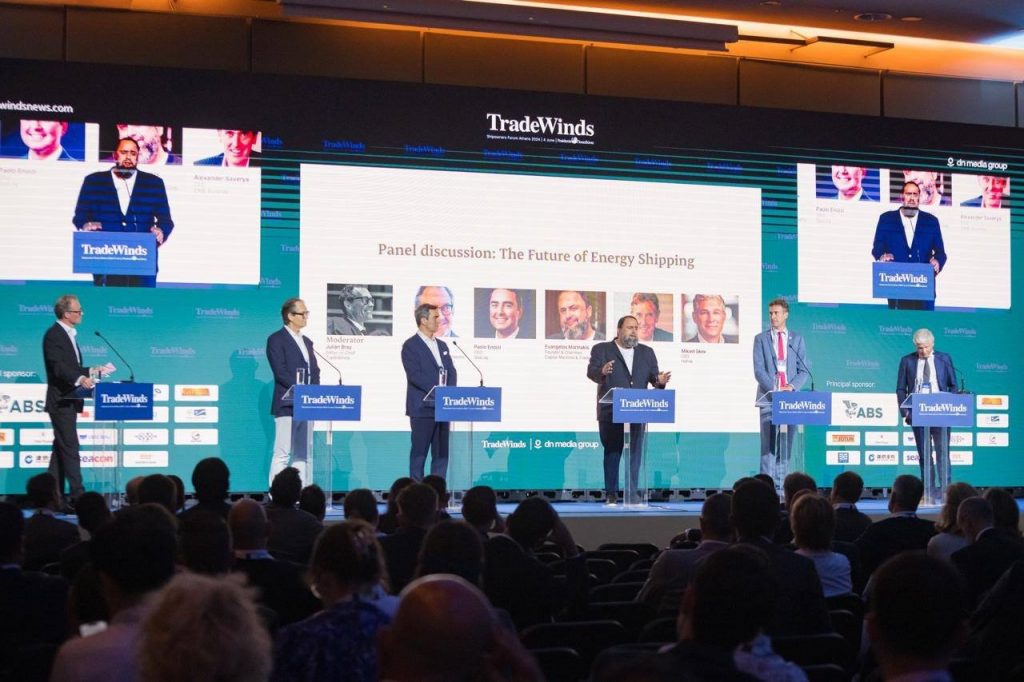
From Left: TradeWinds Editor-in-Chief Julian Bray; Andy Dacy, CEO of J.P. Morgan Asset Management’s global transportation group; Paolo Enoizi, CEO of GasLog Ltd.; Capital Maritime & Trading Corp. Founder and Chairman Evangelos Marinakis; Alexander Saverys, CEO of CMB and Euronav, and Mikael Skov, CEO of Hafnia.
Marinakis on success of Olympiacos: It is very good for the country
The panel discussion closed on a very upbeat but non-shipping note, with TradeWinds Editor-in-Chief turning to football and this year’s stunning successes by the Olympiacos Piraeus football family, as Olympiacos FC last week won the UEFA Conference League championship – a month after the Olympiacos U-19 team won this year’s UEFA Youth League championship.
“First of all, congratulations from everyone on the success of Olympiacos…Are you pleased with the performance of the youth team?” Bray asked.
Marinakis explained that “the Olympiacos youth team won the Youth League of the Champions League of UEFA, and it’s the first time in the history of UEFA that a team wins both titles. But they are not young; a 19-year-old in modern football is not young… or an 18-year-old; all these teams that we played with – Bayern, Inter, Milan – they are teams that, in the men’s team, they have at least a minimum of three and up to six players in the first team, both 18 and 19.”
Turning to the Premier League and Marinakis’ other hugely popular club, historic Nottingham Forest, Bray asked whether “you will build a new ground for Nottingham Forest to take them to the Premiership title in a few years’ time?”
“For sure!” was the immediate answer.
“The ground of 30,000 is not enough or anywhere near. So, we’re try to either increase the capacity, get the permission from the Council for City Ground, or, we have found an area where we can easily build the 50,000 – 55,000 (stadium), which will change the whole region. So, very soon we have to decide, and, for sure, we’ll go forward with the big project.”
TradeWinds Editor-in-Chief Julian Bray
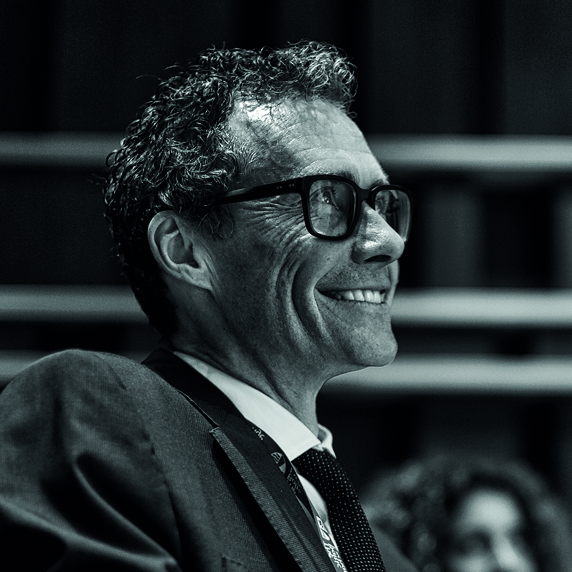
Moderator: Julian Bray Editor-in-Chief, TradeWinds
In his introductory remarks, panel moderator Julian Bray put things into perspective about the sheer magnitude and significance of the shipping sector, highlighting that energy shipping, for instance, makes up about 38% of the total shipping volumes being transported today.
“That’s all of that 12.3 billion tons, a ton and a half for every person on the planet. Here in Greece, it represents about 50% of the total market. Thus, the evolving nature of ‘energy shipping’ will be absolutely critical for the future,” Bray emphasized.
During the discussion held at the Tradewinds Shipowners Forum Athens at Posidonia 2024, the panelists highlighted the challenges and promising opportunities that lay ahead. Energy transition, the Greek economy and geopolitical risks were some of the key points the participants broached during the sit-down talk moderated by Bray.
Alexander Saverys, CEO of CMB and Euronav: I think a black swan is probably what worries me
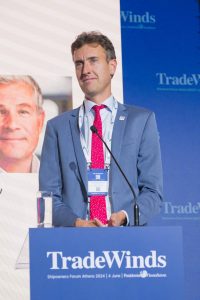
Alexander Saverys Chief Executive Officer, CMB and Euronav
Alexander Saverys, CEO of CMB and Euronav said that despite strong market conditions, expressed concern about the industry’s lack of preparedness for the energy transition. He emphasized the need for investment in new technologies to decarbonize the industry. Responding to a question about energy transition he stated: “Bet on tomorrow. I don’t think it’s a bet. It’s basically making sure that your company is ready for the future. And either you wait, you milk the cow, you have your earnings, you pay dividends, which is very nice, which we are doing as well, and do nothing next to that. Or you’re trying to put some money on the sides to invest in all the new technologies that we will have to develop in order to decarbonise our industry, and the fact that we will have to decarbonise. It’s a fact we can run, but we cannot hide. And I personally believe that if you are prepared, you will have better answers and then hopefully better profits in the future.”
Asked by Bray about the challenges of markets today, Saverys said:
“I think in general today all markets are very strong. What worries me is that since three days being here, not a lot of people seem to be worried. And that’s usually, as you just said, remember 2008. That’s usually when something happens. But let’s not spoil the party. You know, we’re in a good market. We know we’ve been through this, all of us. We know what we need to do. And I think a black swan is probably what worries me.”
Paolo Enoizi, the CEO of GasLog Ltd.
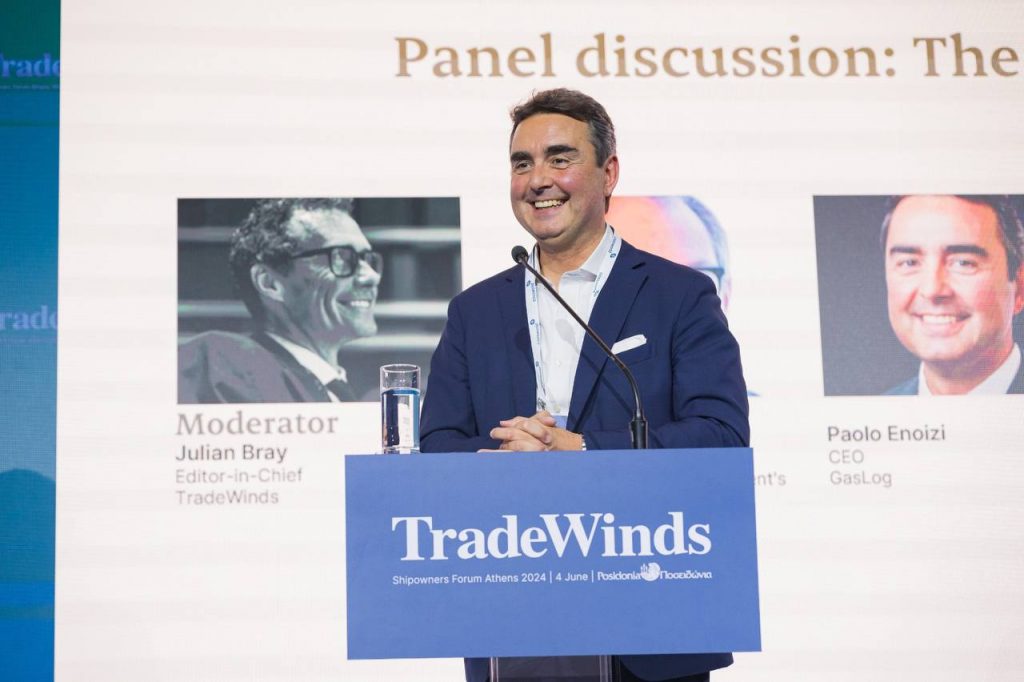
Paolo Enoizi Chief Executive Officer, GasLog
On his part, Paolo Enoizi, CEO of GasLog raised the issue of geopolitical events that had boosted the outlook for oil and gas shipping. Enoizi highlighted the flexibility of the industry to adapt to changing market conditions.
“I think in general, whenever you have discussions on ships, you’re naturally edged on both sides. I mean, you buy a vessel today, you operate it for the next 25 or 30 years. So you have to be sure that you do something today and you’re naturally propelled to understand what’s going to happen on your assets for the next ten years, which is far beyond, even beyond the ten years of peak oil and far beyond what you can see. Now we believe in gas, as let’s say the geopolitical events have clearly reset the perspective to which oil and gas in Europe, probably more gas and oil, have been seen by even the consumers.”
“I think what we’ve seen, at least in the gas sector, is that many of the charter, as many of the final uses they started, now, are appreciating the, let’s say, how quickly they can divert vessels, different than a pipeline into using into serving different markets accordingly to one needs and two trading opportunities. So the FOB model now has become more interesting because it creates an additional value. So I think, you know, the the first value which as we move energy around the world, but the second one is in a way we create a lot more value now. And I believe that this is something that is going to stay with us for quite some time.
Mikael Skov, CEO of Hafnia
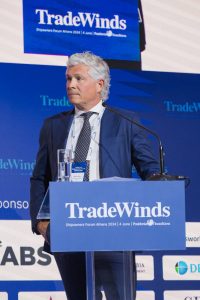
Mikael Skov CEO of Hafnia
Mikael Skov, CEO of Hafnia underlined that while the supply and demand fundamentals for oil are strong, expressed concern about geopolitical risks. He believes that the industry needs to be cautious and prepare for potential disruptions.
“I think we’re looking into a market where from the supply demand side, I’m super comfortable. I think the geopolitical risk is the one. Right. And there are plenty of them. So, you know, I think also we should be a bit cautious now. We are a little bit back in the excitement. It’s great to be a president. Everyone’s like having a great time. But I do think we have some sufficiently serious problems out there just to keep an eye on.”
“…I think fundamentally for us, we’re actually more concerned that we’re going to have enough ships and enough scale to take advantage of the current business. And, you know, back to what you said earlier, I do think that we’ve come out of a period where we mistakenly thought that the energy complex would change overnight, which evidently now it’s not.”
Andy Dacy, the CEO of J.P. Morgan Asset Management’s global transportation group
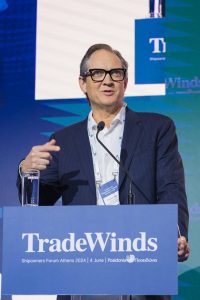
Andrian Dacy CEO & CIO, J.P. Morgan Asset Management’s Global Transportation Group
Andrian Dacy, CEO & CIO of Global Transportation Group at J.P. Morgan Asset Management emphasized the importance of considering long-term trends when planning for the future. He believes that the demand for oil and gas will remain strong for decades to come, while the growth of renewable energy will not be able to fully meet the increasing demand for energy. He also highlighted the potential impact of artificial intelligence on energy consumption.
“And I think it comes down to particularly in this space, whether it is renewable energy or the future of energy itself, into two different components. One is I do think if we think about the current consumption of crude oil and gas, by whatever estimate, and I suspect there will be more fines of some sort, but those will be marginal. We have about 50 years, give or take. And maybe as renewable energy comes in, if it is not consumed by things like AI, which is obviously going to be using a lot more energy, I don’t know if we maybe we got 60 years.”
“What we’re going to be having to grapple with is we can build the ships, we can even find the fueling depots. But if we can’t get the renewable energy, we’re not going to have the renewable carbon. Efficient fuel to put into our ship. So. You know, that’s not a solution that we can make, but we can certainly work together to try to encourage those that have the renewable energy that come into shipping somehow. I don’t have the answer to that question.”
